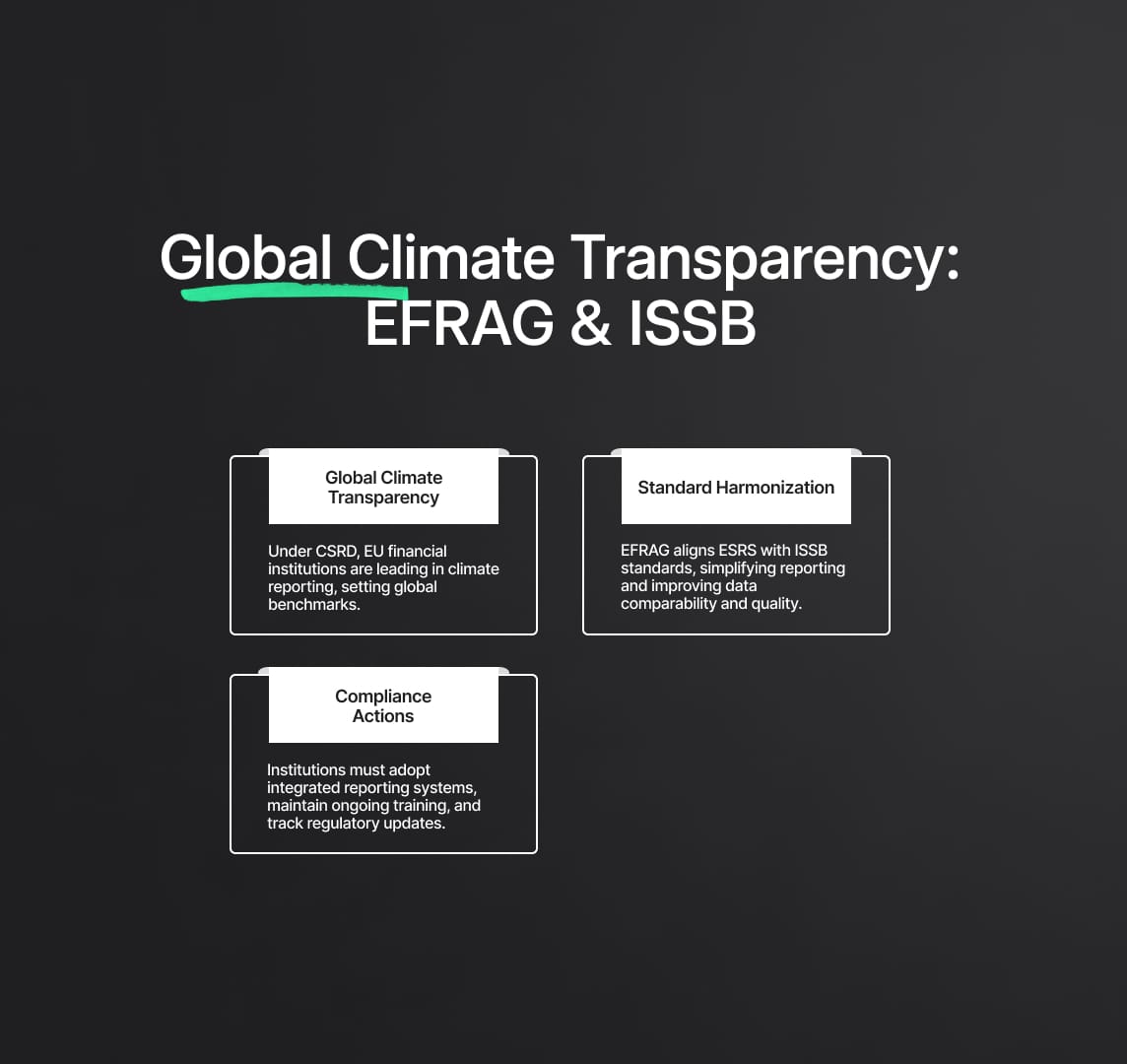EFRAG on ISSB Climate-Related Legal Framework
EFRAG's endorsement of ISSB's climate disclosures marks a major step for global climate transparency, aligning with CSRD. This move impacts EU financial institutions, streamlining reporting processes and setting new environmental reporting standards.

EFRAG on ISSB's Global Climate-Related Disclosures Under European Legal Framework
In a recent move to further strengthen its commitment to improving climate transparency worldwide, the European Financial Reporting Advisory Group (EFRAG) endorsed the International Sustainability Standards Board's (ISSB) effort to create strong guidelines for disclosures surrounding climate change. In order to fulfill the increasing demand for global transparency regarding climate-related risks and possibilities, this support is essential.
The fact that EFRAG has endorsed the initiative is evidence of their commitment to promoting global sustainability reporting advancements, which is firmly anchored within the legal parameters established by the European Corporate Sustainability Reporting Directive (CSRD).
The recently established European Sustainability Reporting Standards (ESRS) have made a significant advance by aligning with the standards on climate-related disclosures of the ISSB. This alignment improves the overall efficacy and consistency of climate reporting by guaranteeing a thorough and cohesive approach across many reporting frameworks. Organizations that comply with European rules can easily meet the requirements of the ISSB by incorporating these standards. This synergy improves the caliber of climate reporting worldwide while simultaneously streamlining the reporting process.
In addition, the creation of an interoperability map by EFRAG and ISSB represents a significant advancement in the field of climate reporting. This accomplishment demonstrates the increasing significance of a single, climate-related legal framework in promoting sustainable activities across the globe. It is anticipated that the interoperability map will further improve the comparability and clarity of information relevant to climate change, enabling stakeholders to make well-informed decisions.
This project emphasizes how important it is to have a unified legislative framework for sustainability and climate reporting. EFRAG and ISSB are establishing a standard for international collaboration in the fight against climate change by promoting a united strategy. Their work has a major impact on the creation of a strong, open, and functional legislative framework pertaining to climate change, which is necessary for environmentally responsible development and sustainable development.

Global Climate Transparency: EFRAG's Endorsement of ISSB Standards
In the area of environmental accountability, the European Financial Reporting Advisory Group (EFRAG) has made history by supporting the climate-related disclosures made by the International Sustainability Standards Board (ISSB).
This strategic endorsement, in accordance with the European Corporate Sustainability Reporting Directive (CSRD), is a significant step toward global climate transparency. It involves a wide range of financial organizations in the EU, including banks, insurance companies, and large corporations. These organizations are now leading the charge to promote climate transparency on a worldwide scale and are establishing new benchmarks for environmental reporting.
- EFRAG has established a single reporting framework by incorporating the ISSB recommendations into the European Sustainability Reporting Standards (ESRS).
- In addition to guaranteeing a smooth integration of international standards, this alignment streamlines reporting procedures for EU firms.
- By making climate reporting more thorough and internationally comparable, the action improves its overall quality and efficacy.
The move by EFRAG is a revolutionary step toward global sustainability reporting unification. The production of transparent, comparable climate-related data across jurisdictions is contingent upon the harmonization of these standards, and it will play a major role in advancing global climate transparency.
To ensure compliance and adaptation to these new standards, financial institutions must:
- Use integrated reporting systems: For smooth compliance and efficient reporting, adherence to ESRS and ISSB requirements is essential.
- Ongoing Training and Updates: implementing ongoing training initiatives and keeping reporting procedures up to speed with the most recent standards.
- Observing Regulatory Changes: Staying informed about new regulations and changes pertaining to climate reporting.
For organizations hoping to make a meaningful contribution to the global climate transparency agenda, proactively adapting to these requirements is essential.
Global Climate Transparency
Over the next few years, a gradual but considerable shift is anticipated as EFRAG and ISSB continue to roll out their standards. Financial institutions must be on the lookout for these changes and react accordingly:
- In order to comply with the new criteria, the transition phase will be essential.
- For timely compliance, institutions need to keep a careful eye on regulatory modifications and deadlines.
- Financial institutions have the chance to take the lead in international initiatives for honest and sustainable climate reporting.
In summary, EFRAG's partnership with ISSB contributes significantly to the establishment of an open, functional framework for global climate transparency in addition to streamlining reporting procedures. This initiative, which sets a new standard for environmental stewardship and emphasizes the significance of international cooperation in climate reporting, represents a turning point in the transition to a sustainable future.
Reduce your
compliance risks

